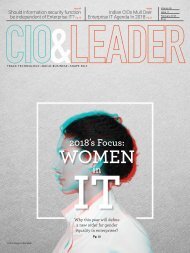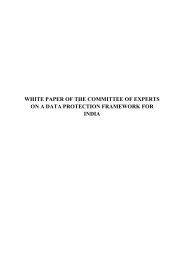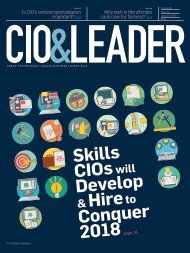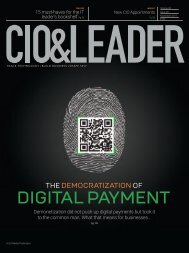C&L_December 2017 (1)
You also want an ePaper? Increase the reach of your titles
YUMPU automatically turns print PDFs into web optimized ePapers that Google loves.
Cover Story+<br />
a. Data should be completely erased<br />
b. Data may be retained in anonymised form<br />
[Part III/Ch.7 (Storage limitation and data quality)/Q3/Pg.121]<br />
Should there be a restriction on the categories of information<br />
that an individual should be entitled to when exercising<br />
their right to access?<br />
[Part III/Ch.8 (Individual Participation Rights-1)/Q2/Pg.128]<br />
What should be the scope of the right to rectification?<br />
Should it only extend to having inaccurate date rectified<br />
or should it include the right to move court to get an order<br />
to rectify, block, erase or destroy inaccurate data as is the<br />
case with the UK?<br />
[Part III/Ch.8 (Individual Participation Rights-1)/Q3/Pg.128]<br />
Should there be a fee imposed on exercising the right to<br />
access and rectify one‘s personal data? Alternatives:<br />
a. There should be no fee imposed.<br />
b. The data controller should be allowed to impose a reasonable<br />
fee.<br />
c. The data protection authority/sectoral regulators may<br />
prescribe a reasonable fee.<br />
[Part III/Ch.8 (Individual Participation Rights-1)/Q4/Pg.128]<br />
Should there be a fixed time period within which organisations<br />
must respond to such requests? If so, what should<br />
these be?<br />
[Part III/Ch.8 (Individual Participation Rights-1)/Q5/Pg.128]<br />
Is guaranteeing a right to access the logic behind automated<br />
decisions technically feasible? How should India<br />
approach this issue given the challenges associated with it?<br />
[Part III/Ch.8 (Individual Participation Rights-1)/Q6/Pg.128]<br />
What should be the exceptions to individual participation<br />
rights?<br />
[For instance, in the UK, a right to access can be refused<br />
if compliance with such a request will be impossible or<br />
involve a disproportionate effort. In case of South Africa<br />
and Australia, the exceptions vary depending on whether<br />
the organisation is a private body or a public body.]<br />
[Part III/Ch.8 (Individual Participation Rights-1)/Q7/Pg.128]<br />
The EU GDPR introduces the right to restrict processing<br />
and the right to data portability. If India were to adopt<br />
these rights, what should be their scope?<br />
[Part III/Ch.9 (Individual Participation Rights-2)/Q2/Pg.136]<br />
Should there be a prohibition on evaluative decisions<br />
taken on the basis of automated decisions? Alternatives<br />
a. There should be a right to object to automated decisions<br />
as is the case with the UK.<br />
b. There should a prohibition on evaluative decisions<br />
based on automated decision making.<br />
[Part III/Ch.9 (Individual Participation Rights-2)/Q3/Pg.136]<br />
Given the concerns related to automated decision making,<br />
including the feasibility of the right envisioned under<br />
the EU GDPR, how should India approach this issue in<br />
the law?<br />
[Part III/Ch.9 (Individual Participation Rights-2)/Q4/Pg.136]<br />
Should direct marketing be a discrete privacy principle,<br />
or should it be addressed via sector specific regulations?<br />
[Part III/Ch.9 (Individual Participation Rights-2)/Q5/Pg.136]<br />
What are your views on the right to be forgotten having<br />
a place in India‘s data protection law?<br />
[Part III/Ch10 (Individual Participation Rights-3)/Q1/Pg.141]<br />
Should the right to be forgotten be restricted to personal<br />
data that individuals have given out themselves?<br />
[Part III/Ch10 (Individual Participation Rights-3)/Q2/Pg.141<br />
Does a right to be forgotten add any additional protection<br />
to data subjects not already available in other individual<br />
participation rights?<br />
[Part III/Ch10 (Individual Participation Rights-3)/Q3/Pg.141]<br />
Does a right to be forgotten entail prohibition on display/dissemination<br />
or the erasure of the information from<br />
the controller‘s possession?<br />
[Part III/Ch10 (Individual Participation Rights-3)/Q4/Pg.141]<br />
Does co-regulation seem an appropriate approach for a<br />
data protection enforcement mechanism in India?<br />
[Part IV/Ch. 1 (Regulation and enforcement)/Q2/Pg.146]<br />
What are the specific obligations/areas which<br />
may be envisaged under a data protection law in India<br />
for a (i) command and control approach; (ii) selfregulation<br />
approach (if any); and (iii) co-regulation<br />
approach?<br />
[Part IV/Ch. 1 (Regulation and enforcement)/Q3/Pg.146]<br />
What are the organizational measures that should<br />
be adopted and implemented in order to demonstrate<br />
accountability? Who will determine the standards which<br />
such measures have to meet?<br />
[Part IV/Ch. 2 (Accountability and enforcement tools)/Q2/Pg.155]<br />
Should the lack of organizational measures be linked to<br />
liability for harm resulting from processing of personal<br />
data?<br />
[Part IV/Ch. 2 (Accountability and enforcement tools)/Q3/Pg.155]<br />
Should all data controllers who were involved in the<br />
processing that ultimately caused harm to the individual<br />
be accountable jointly and severally or should they be<br />
allowed mechanisms of indemnity and contractual affixation<br />
of liability inter se?<br />
[Part IV/Ch. 2 (Accountability and enforcement tools)/Q4/Pg.155]<br />
<strong>December</strong> <strong>2017</strong> | CIO&LEADER<br />
17














